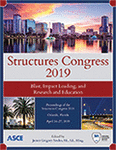Structures Congress 2019
Improved Learning through In-Class Assessment
Publication: Structures Congress 2019: Blast, Impact Loading, and Research and Education
ABSTRACT
Often, students arrive to their engineering classes day after day unprepared. When taking a course without reading quizzes, they are almost guaranteed to come to class without cracking open their textbook for even a cursory reading of upcoming material. When taking a course with reading quizzes, they might take the time to skim through the reading in hopes of catching a glimpse of a basic concept or key definition, since reading quizzes are typically not worth a significant percentage of their final grade. The authors surveyed students at the end of three semesters of engineering courses and discovered that well over half of the students in the course completed assigned readings prior to a given lesson less than one quarter of the time. The authors were determined to motivate students to read prior to class in order to provide students with an orientation of the material, encourage students to think critically about the subject matter, and contribute to student learning. Thus, the authors implemented an “In-Class Assessment” policy in their steel and wood design course. For the duration of the course, students sat in their self-selected project teams, each of which consisted of three students. Based on a roll of a dice, one person from each project team would stand up in class and answer a question from their instructor. If the student answered the question correctly, the entire project team earned their point for the day. If the student answered the question incorrectly, the entire team did not earn the point for that day. Key to implementation was removing anxiety for receiving low end-of-course grades for incorrect answers and ensuring the assessment was not perceived as a “haze” by the instructor, as the natural peer pressure for students to appear “qualified” in front of their peers provided incentive for students to prepare for class. Effectiveness of this verbal assessment procedure was assessed using both student course-end feedback and course assessment from the instructors (grades and time surveys). This paper will make the case that this pedagogy benefits the structural engineering profession by: getting young engineers in the practice of what engineers already do (prepare for work), increasing student understanding of a topic, and improving the ability of future structural engineers to communicate explanations clearly and effectively.
Get full access to this article
View all available purchase options and get full access to this chapter.
REFERENCES
Andre, T. (1987). “Questions and learning from reading.” Questioning Exchange.
Bloom, B. (1956). Taxonomy of educational objectives: The classification of educational goals. Vol. 1: Cognitive domain. New York: McKay.
Carney, A., Fry, S., Gabriele, R., and Ballard, M. (2008). “Reeling in the big fish. Changing pedagogy to encourage the completion of reading assignments.” College Teaching.
Gooblar, D. (2014). “They Haven’t Done the Reading. Again.” Pedagogy Unbound. https://chroniclevitae.com/news/719-they-haven-t-done-the-reading-again
Lowman, J. (1995). Mastering the Techniques of Teaching. 2nded. San Francisco: Jossey-Bass.
Martin, F., and Saljo, R. (1976). “On qualitative differences in learning: II-Outcome as a function of the learner’s conception of the task.” British Journal of Educational Psychology.
McKeachie, W. (1999). Teaching Tips, Strategies, Research, and Theory for College and University Teachers. 10thed. Boston: Houghton Mifflin Company.
Nilson, L. (2010). Teaching at Its Best. 3rded. San Francisco: Jossey-Bass.
Wankat, P., and Oreovicz, F. (1993). Teaching Engineering, New York, McGraw-Hill.
Information & Authors
Information
Published In
Structures Congress 2019: Blast, Impact Loading, and Research and Education
Pages: 205 - 214
Editor: James Gregory Soules, McDermott International
ISBN (Online): 978-0-7844-8224-7
Copyright
© 2019 American Society of Civil Engineers.
History
Published online: Apr 22, 2019
Published in print: Apr 22, 2019
Authors
Metrics & Citations
Metrics
Citations
Download citation
If you have the appropriate software installed, you can download article citation data to the citation manager of your choice. Simply select your manager software from the list below and click Download.
